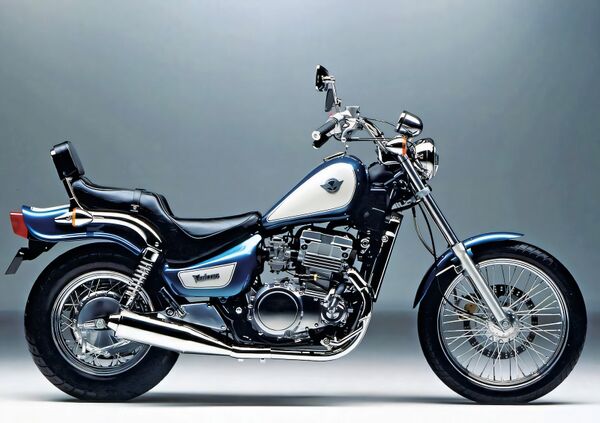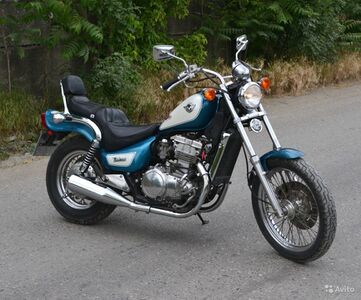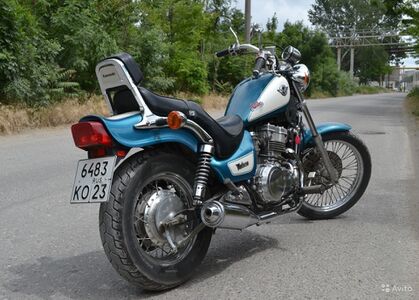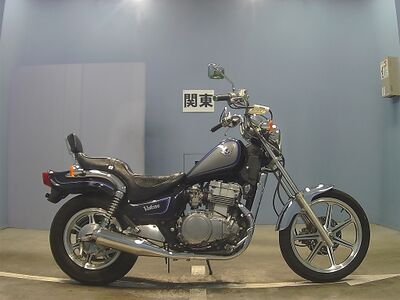Difference between revisions of "Kawasaki EN400 Vulcan"
m |
m |
||
| (5 intermediate revisions by the same user not shown) | |||
| Line 1: | Line 1: | ||
{{DISPLAYTITLE: Kawasaki EN 400 Vulcan}} | {{DISPLAYTITLE: Kawasaki EN 400 Vulcan}} | ||
| + | {{#seo: | ||
| + | |keywords={{PAGENAME}}, review, specs, owners manual, service manual, guide | ||
| + | |og:image=https://en.enduro.team/images/6/6e/Vn-400-vulcan_1994_1.jpg | ||
| + | }} | ||
__notoc__ | __notoc__ | ||
| − | [[file: Vn-400-vulcan 1994 1.jpg | | + | [[file: Vn-400-vulcan 1994 1.jpg | 600px | center | Kawasaki EN400 Vulcan (EN400B, EN400C)]] |
| − | + | '''Kawasaki EN 400 Vulcan''' was created in 1985 based on the export version of the Kawasaki EN450 Vulcan (Vulcan 454 LTD) and was intended for the domestic Japanese market. | |
{{Ads_top}} | {{Ads_top}} | ||
| − | + | ||
| + | ''' Lineup: ''' | ||
| + | * [[Kawasaki_EN400_Vulcan | Kawasaki EN 400 Vulcan]] | ||
| + | * [[Kawasaki_EN500_Vulcan | Kawasaki EN 500 Vulcan]] | ||
| + | * [[Kawasaki_Vulcan_S | Kawasaki EN 650 Vulcan (Vulcan S)]] | ||
| + | |||
| + | ''' Main competitors: ''' | ||
| + | * [[Honda_Steed_400 | Honda Steed 400]] | ||
| + | * [[Suzuki_VS400_Intruder | Suzuki VS400 Intruder]] / [[Suzuki_LS650_Savage | Suzuki LS650 Savage]] | ||
| + | * [[Yamaha_XV400_Virago | Yamaha XV400 Virago]] | ||
| + | |||
| + | |||
| + | EN 400 Vulkan was based on a 2-cylinder in-line liquid-cooled engine with a volume of about 400 cubic meters. cm, delivering 45 hp. power and 33 Nm of torque. The engine was taken almost unchanged from the sports model Kawasaki GPZ400S and was subsequently installed on [[Kawasaki_EX-4 | Kawasaki EX-4]] and [[Kawasaki_KLE400 | Kawasaki KLE 400]]. At that time, the company did not have experience in creating classic cruisers, therefore, they were often based on sufficiently forced engines, delivering record power for a motorcycle of this class. Over time, all Japanese companies came to the correct understanding of the "cruiser" class and updated their models, making them more similar to American classic motorcycles. | ||
Among the features of the Kawasaki EN 400 Vulcan, it should be noted the classic steel frame, belt drive, front disc brake (rear - drum), 6-speed gearbox, 11 l fuel tank and 197 kg of curb weight. | Among the features of the Kawasaki EN 400 Vulcan, it should be noted the classic steel frame, belt drive, front disc brake (rear - drum), 6-speed gearbox, 11 l fuel tank and 197 kg of curb weight. | ||
| Line 11: | Line 27: | ||
The very same model Kawasaki EN400 Vulcan is often considered as the first generation of the Vulcan 400 series. Since 1995, the EN400 Vulcan changes its name to [[Kawasaki_VN400_Vulcan | VN400 Vulcan]], gets a completely different look, a new V-engine, and also two new modifications - Classic and Drifter. It was this generation that gained wide popularity in Japan and Russia, while the Kawasaki EN400 Vulcan was never in good demand - this model is quite rare at Japanese auctions, and literally a few units are presented in Russia. | The very same model Kawasaki EN400 Vulcan is often considered as the first generation of the Vulcan 400 series. Since 1995, the EN400 Vulcan changes its name to [[Kawasaki_VN400_Vulcan | VN400 Vulcan]], gets a completely different look, a new V-engine, and also two new modifications - Classic and Drifter. It was this generation that gained wide popularity in Japan and Russia, while the Kawasaki EN400 Vulcan was never in good demand - this model is quite rare at Japanese auctions, and literally a few units are presented in Russia. | ||
| − | '' | + | ''' Generations: ''' |
* 1985-1988 - '''first generation'''. The model has the official name - '''Kawasaki EN400 Twin'''. Differs in cast wheels. The factory designation of the model is '''EN400-A'''. | * 1985-1988 - '''first generation'''. The model has the official name - '''Kawasaki EN400 Twin'''. Differs in cast wheels. The factory designation of the model is '''EN400-A'''. | ||
* 1990-1994 - '''second generation'''. The model has the official name - '''Kawasaki EN400 Vulcan''' (EN400-B) and '''Kawasaki EN400''' (EN400-C). This generation features classic spoked wheels. | * 1990-1994 - '''second generation'''. The model has the official name - '''Kawasaki EN400 Vulcan''' (EN400-B) and '''Kawasaki EN400''' (EN400-C). This generation features classic spoked wheels. | ||
| − | |||
| − | |||
| − | |||
| − | |||
| − | |||
== Photos == | == Photos == | ||
| − | + | <gallery mode="packed" heights=200px> | |
| − | + | File: 2372692727.jpg| | |
| − | + | File: 2372692774.jpg| | |
| − | + | File:En400 l.jpg| | |
| − | + | </gallery> | |
| − | |||
{{Ads_feed}} | {{Ads_feed}} | ||
{{Ads_post}} | {{Ads_post}} | ||
Latest revision as of 16:29, 13 July 2023
Kawasaki EN 400 Vulcan was created in 1985 based on the export version of the Kawasaki EN450 Vulcan (Vulcan 454 LTD) and was intended for the domestic Japanese market.
Lineup:
Main competitors:
EN 400 Vulkan was based on a 2-cylinder in-line liquid-cooled engine with a volume of about 400 cubic meters. cm, delivering 45 hp. power and 33 Nm of torque. The engine was taken almost unchanged from the sports model Kawasaki GPZ400S and was subsequently installed on Kawasaki EX-4 and Kawasaki KLE 400. At that time, the company did not have experience in creating classic cruisers, therefore, they were often based on sufficiently forced engines, delivering record power for a motorcycle of this class. Over time, all Japanese companies came to the correct understanding of the "cruiser" class and updated their models, making them more similar to American classic motorcycles.
Among the features of the Kawasaki EN 400 Vulcan, it should be noted the classic steel frame, belt drive, front disc brake (rear - drum), 6-speed gearbox, 11 l fuel tank and 197 kg of curb weight.
The export version Kawasaki EN500 Vulcan (which replaced the Vulcan 454 LTD) was subsequently created on a single base with the Kawasaki EN400 Vulcan, which was soon updated and changed its name to Vulcan 500 LTD, and was sold on foreign markets until 2009.
The very same model Kawasaki EN400 Vulcan is often considered as the first generation of the Vulcan 400 series. Since 1995, the EN400 Vulcan changes its name to VN400 Vulcan, gets a completely different look, a new V-engine, and also two new modifications - Classic and Drifter. It was this generation that gained wide popularity in Japan and Russia, while the Kawasaki EN400 Vulcan was never in good demand - this model is quite rare at Japanese auctions, and literally a few units are presented in Russia.
Generations:
- 1985-1988 - first generation. The model has the official name - Kawasaki EN400 Twin. Differs in cast wheels. The factory designation of the model is EN400-A.
- 1990-1994 - second generation. The model has the official name - Kawasaki EN400 Vulcan (EN400-B) and Kawasaki EN400 (EN400-C). This generation features classic spoked wheels.
Photos
Specifications
Specifications Kawasaki EN400 Vulcan:
| Model | Kawasaki EN400 Vulcan |
|---|---|
| Motorcycle type | cruiser |
| Year of release / sales | 1985-1994 |
| Engine type | 2-cylinder, 4-stroke, in-line |
| Working volume | 398 cc cm. |
| Cooling | liquid |
| Bore / stroke | 70.0 x 51.0 mm |
| Compression ratio | 10.7: 1 |
| Number of valves per cylinder | 4 valves per cylinder (DOHC) |
| Fuel supply system | carburetor x2 Keihin CVK34 |
| Ignition type | transistor |
| Maximum power | 45 hp (33 kW) at 9500 rpm |
| Maximum torque | 33.34 Nm (3.4 kgm) at 8000 rpm |
| Gearbox | 6-speed |
| Drive type | belt |
| Frame | steel tubular |
| Front suspension | 36mm telescopic fork, 150mm travel |
| Rear suspension | linkage with two shock absorbers (adjustable preload), stroke - 100 mm |
| Front tire size | 100 / 90-19 |
| Rear tire size | 140 / 90-15 |
| Front brakes | 1 disc 300 mm, 1-piston caliper |
| Rear brakes | drum |
| Dimensions (L x W x H) | 2205 x 820 x 1220 mm |
| Saddle height | 745 mm |
| Wheelbase | 1485 mm |
| Fuel tank capacity | 11.0 l |
| Maximum speed | 160 km / h |
| Motorcycle weight (curb) | 197 kg |
Documentation



